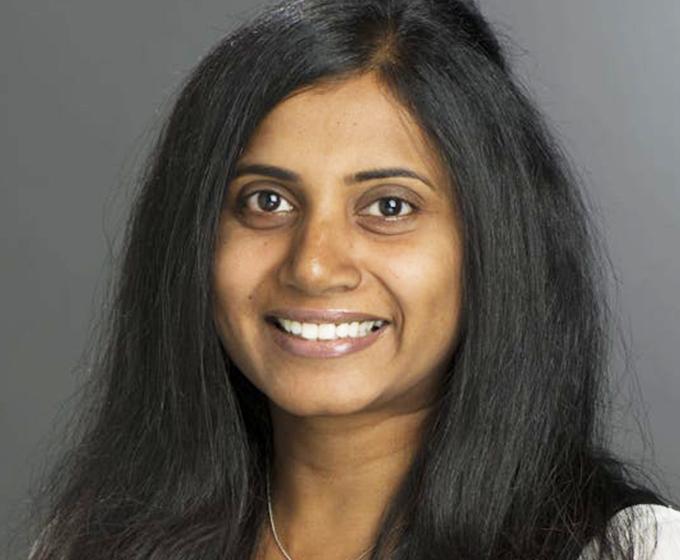University led research attempts to close the performance gap between modern artificial intelligence (AI) systems and biological systems

Credit: UTSA
Dhireesha Kudithipudi, founding director of the MATRIX AI Consortium for Human Well-Being, and the Robert F McDermott Endowed Chair in Engineering, was recently awarded $1,481,697 in combined funding for her research in lifelong learning. This funding includes a $472,306 sub-award from Argonne National Laboratory under the Defense Advanced Research Projects Agency’s (DARPA) Lifelong Learning Machines (L2M) program, along with a $1,009,391 award from the Air Force Research Laboratory (AFRL).
These awards will fund Kudithipudi’s ongoing research developing novel brain-inspired lifelong learning algorithms and systems. Her approaches attempt to close the performance gap between modern artificial intelligence (AI) systems and biological systems, allowing them to learn new tasks while simultaneously improving their energy efficiency.
“Machine learning (ML), which is a subset of artificial intelligence (AI), allows computers to leverage large sets of data to learn how to perform specific tasks, such as recognizing objects in an image or translating languages.
“While current ML algorithms have achieved remarkable results, these systems are still not as intelligent as living organisms. One key limitation is their inability to adapt to new scenarios which weren’t encountered during their original training procedure. We’re attempting to close this gap by incorporating unique aspects of biological intelligence within our AI models, such as the ability to add additional processing capacity over time (“neurogenesis”), along with mimicking the evolutionary process within our design procedure (“neuroevolution”),” explained Kudithipudi.
In regards to the L2M project, Kudithipudi and her Ph.D. students Nicholas Soures, Tej Pandit, and Anurag Daram are collaborating with researchers from Argonne and Sandia National Labs to develop energy-efficient lifelong learning algorithms which are inspired by the honeybee brain.
Although insect brains are a million times smaller, they are still capable of producing approximately half of the distinct cognitive behaviors of mammals. Replicating this efficiency is key to implementing AI algorithms on energy-constrained devices, such as mobile phones, IoT, or wearable devices.
Meanwhile, Kudithipudi’s AFRL project is focused on developing a neuromorphic chip with life-long learning capabilities on the end device. The chip will be fabricated at the SUNY Polytechnic Institute.
“The field of neuromorphic computing, which uses inspiration from the brain to design computing systems, has been instrumental in boosting AI capabilities. There is a recent surge of activity in this area as new device technologies for neurons and synapses offer significant promise,” said Kudithipudi. “Our design will be a hybrid technology of CMOS and memristor devices, with on-device training capability. The physics of the CMOS/Memristordevice will be exploited to realize brain-inspired mechanisms, such as metaplasticity, that are critical for lifelong learning capabilities. A unique co-design flow will offer real-time learning capabilities to this system. By implementing life-long learning algorithms which mimic human cognition, the applications of AI will expand dramatically. For DoD applications, this technology will greatly enhance AI-enabled support systems which can adapt quickly in unpredictable situations.”
The MATRIX AI Consortium for Human Well-Being is focused on achieving excellence in AI research and scholarship through transdisciplinary collaboration. This current effort, which leverages innovations from neuroscience to develop novel AI systems, is an excellent example of the types of projects which the Consortium is targeting.
“To develop disruptive AI solutions, researchers must transcend traditional disciplinary boundaries. By bringing together over 60 researchers with diverse expertise from four leading institutions in the greater San Antonio area (UTSA, UT Health, Southwest Research Institute, Texas Biomedical Research Institute), MATRIX is committed to accelerating these innovative transdisciplinary collaborations,” said Bernard Arulanandam, vice president for Research, Economic Development, and Knowledge Enterprise at UTSA.
###
Media Contact
Bruce Forey
[email protected]




